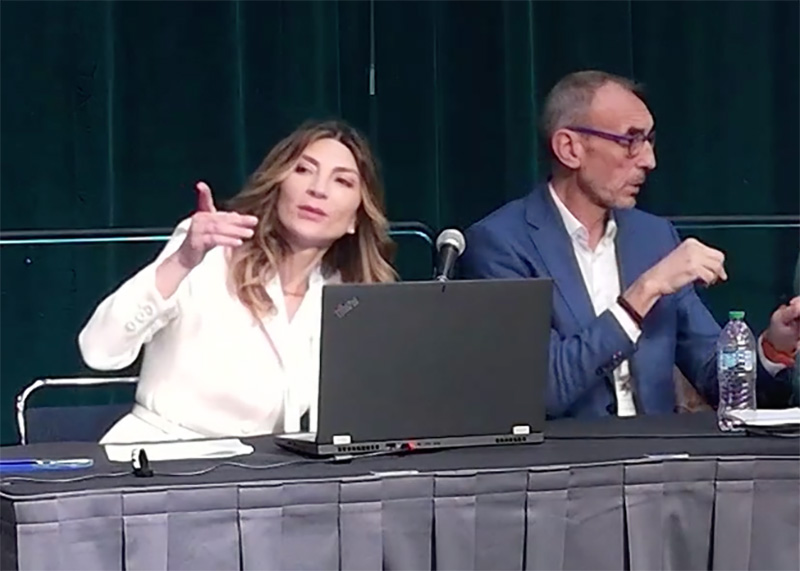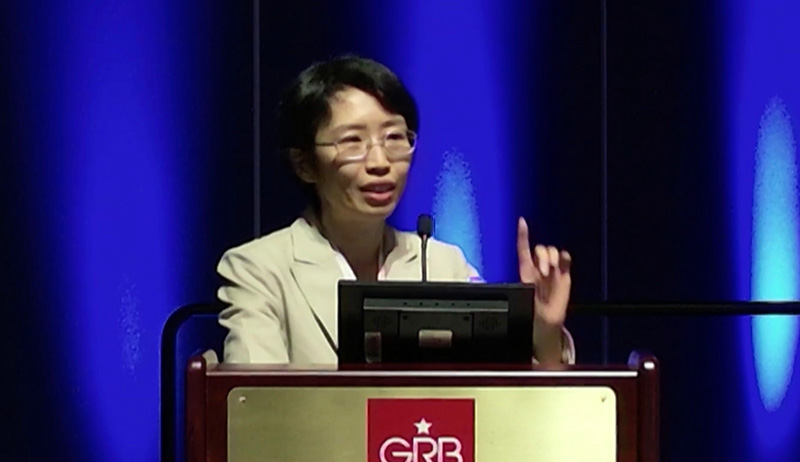Cancer cell and gene therapy continues to be an exciting, impactful and rapidly expanding area of immuno-oncology with many sessions and presentations during the 2024 Society for Immunotherapy for Cancer (SITC) conference led by ACGT Scientific Advisory Council members and Research Fellows who are driving progress in cell and gene therapy for solid tumor cancers.

ACGT Scientific Advisory Council member Katy Rezvani, MD, PhD participated in a session titled “NK Cells: Next Generation Cell Therapies for Cancer” highlighting her groundbreaking work in NK cell therapy development at The University of Texas MD Anderson Cancer Center. Dr. Rezvani presented the engineering of NK cells, discussed the latest strategies and preclinical evidence that underscore the translation of this strategy to the clinic, and showed the impact for patients – several of whom have achieved a complete response in ongoing clinical trials.
During SITC, MD Anderson also officially announced the launch of its Institute for Cell Therapy Discovery & Innovation led by Dr. Rezvani. The new institute will integrate with MD Anderson’s unique research ecosystem, including extensive clinical and scientific expertise, to accelerate the research and development of new cell therapies from preclinical studies through clinical trials.
As part of the SITC pre-conference programming, ACGT Scientific Advisory Council member Shari Pilon-Thomas, PhD (Moffitt Cancer Center), participated in a special Symposium on Tumor Infiltrating Lymphocytes (TIL) that provided an overview of the path to approval for TIL therapy, current clinical management, and the impact of recent FDA-approved therapies while exploring next generation TIL and innovative pre-clinical development.
Dr. Pilon-Thomas also participated in an ACGT-hosted lunch symposium. Presenting a talk titled, “Expanding the Landscape of TIL Therapy beyond Melanoma,” Dr. Pilon-Thomas discussed the challenges and potential paths forward to make TIL therapy for non-melanoma solid tumors feasible. She summarized that to succeed, researchers will need to increase the frequency of tumor-reactive TIL within tumors, improve the expansion of tumor-reactive TIL e- vivo, define the phenotype of effective TIL, and decrease toxicity.
Following Dr. Pilon-Thomas’ talk, George Coukos, MD, PhD (Ludwig Cancer Research Lausanne), an ACGT Research Fellow, presented recent work that addressed the challenges outlined by Dr. Pilon-Thomas, going deeper into what can be learnt from patients who are TIL responders vs. non-responders.
Dr. Coukos made several presentations during the SITC conference focusing on his work in refining methods to develop effective TIL therapies. Dr. Coukos commented that ACGT funding had supported his very first lab back in 2006!
The ACGT symposium also showcased an ambitious and compelling new effort by ACGT Scientific Advisory Council member and Research Fellow, Crystal Mackall, MD (Stanford University), and Catherine Bollard, MD, Children’s National Hospital.
Drs. Mackall and Bollard have launched a non-profit organization ACCESSFORKIDS (AFK) to build a new biotech model to successfully commercialize pediatric cell and gene therapies outside of the standard venture capital-based system.
ACCESSFORKIDS is a 501(c)3 designed to fill the gap for late-stage clinical development of cell therapies for pediatric cancer. In the ACCESSFORKIDS model, academia would hand off therapeutics that have shown promising safety and efficacy in phase 1 studies to the AFK biotech that would ensure pivotal trial readiness, conduct the pivotal trials, file the BLA and commercialize the product on FDA approval, providing pediatric cell therapies a clear path to the patient that does not exist today.

In other SITC sessions, ACGT Research Fellow Yvonne Chen, PhD (University of California, Los Angeles) made a presentation titled, “Multi-Pronged CAR-T Cell Therapy for Cancer” explaining a strategy to develop next-generation cell therapies with enhanced efficacy and reduced toxicity for solid tumors.
ACGT Research Fellow, Brian Brown, PhD (Mount Sinai), made a presentation titled, “Identifying Immunotherapy Targets Using Perturb-map CRISPR Screens.”
ACGT Research Fellow, Brian Brown, PhD (Mount Sinai), made a presentation titled, “Identifying Immunotherapy Targets Using Perturb-map CRISPR Screens.”
The tumor microenvironment (TME) can predict response to immunotherapy with tumors that are infiltrated by activated T cells most likely to respond to immune checkpoint blockade. However, approximately one-third of cancer patients present an “immune-excluded” phenotype where T-cells are pushed to the periphery of the tumor. These tumors have a poor response rate to immunotherapy.
Dr. Brown’s talk focused on how to identify the genes that control the tumor microenvironment in order to influence response to immunotherapy. By analyzing the impact on the TME of knocking in or out specific genes using novel technologies developed in his lab, Dr. Brown aims to overcome immune exclusion and identify which tumors are most likely to respond to immunotherapies.
In the exhibit hall, as part of his role as Editor-in-Chief of the Journal for Immunotherapy for Cancer (JITC), Michael Lotze, MD (University of Pittsburg), who serves as the ACGT Scientific Advisory Council Chair, held a meet and greet session for young researchers seeking guidance on their research projects and papers. The researchers each discussed their SITC posters and received input from Dr. Lotze on how to further explore their research.
Next March, ACGT will attend the 2025 SITC Spring Scientific – Cellular Therapy for Solid Tumors in San Diego, and will host the annual invitation-only ACGT Summit 2025 in New York City.



